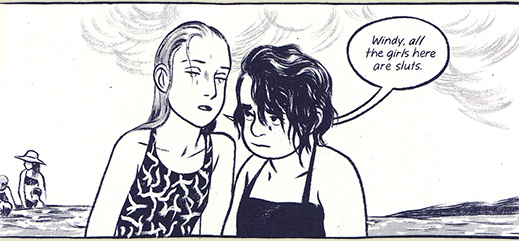I chose the graphic novel This One Summer, written by Mariko Tamaki and illustrated by Jillian Tamaki, for my reading about women in comics this week.
This One Summer struck me with how effectively it deals with the awkward transition phase of the early teenage years. The comic shows a version of everyday life that selectively focuses on the subjects it wants to deal with, like sexuality, seeing parents as flawed, and wanting to be older but not really knowing how. The art style suits the message well too, with the lines drawn as rounded shapes to make the comic feel friendly overall, but still using shading/tones and skillful acting to show more emotional moments.
One thing very unexpected about This One Summer was actually its reviews. I checked the reviews because I was interested in how others might react to this somewhat controversial book (an early teen slice-of-life with some very mature themes). I was surprised to find that many people didn't like the book at all because they thought "nothing happened"–they felt there was no distinct climax, and Rose never apologizes for her slut-shaming or learns a concrete lesson.
I disagree very strongly with these reviews. Rose did learn lessons, but they aren't handed to the reader on a plate, and they aren't concrete for Rose either because that's not how teens–or most people–work. For example, Rose yells for her mother during her biggest time of distress after rejecting and distancing herself from her mother for most of the book. She also begins to see how badly Duncan is behaving towards Jenny, who she had been condemning as a "slut" in order to hold onto an idealized fantasy of her crush.
If at the end of the novel Rose was shown gaining clear understanding of all these muddled and difficult life lessons, that would have actually weakened the narrative. It would be untrue to the confusion of teen years, and would set up unrealistic expectations of how quickly teens should be able to get a grasp on adult life.



Comments
Post a Comment